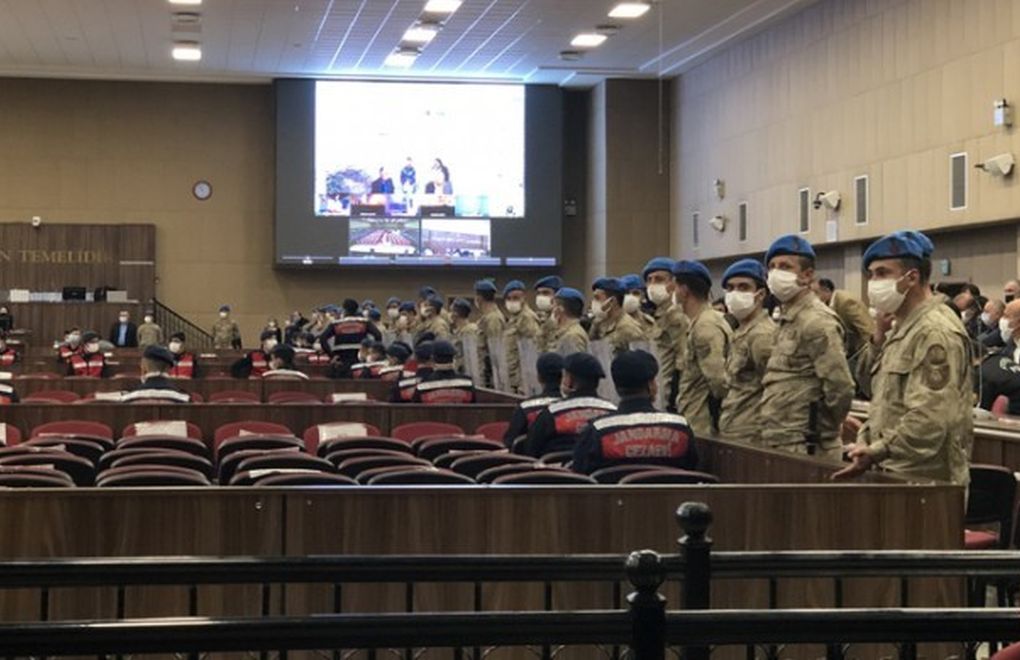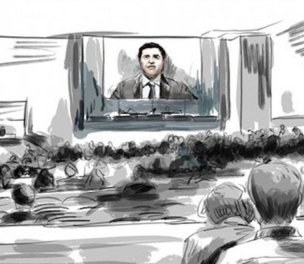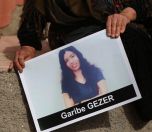* Photo: Mezopotamya Agency (MA)
Click to read the article in Turkish
The first session of the 8th hearing of the Kobanî trial was held at the Ankara 22nd High Criminal Court yesterday (December 20).
In the trial over the "October 6-8, 2014 Kobanî protests", there are 108 defendants, 21 arrested, including former HDP Co-Chairs Figen Yüksekdağ and Selahattin Demirtaş, Democratic Regions Party (DBP) former Co-Chair Sebahat Tuncel and HDP Central Executive Board members.
At yesterday's session, the politicians arrested in the Ankara Sincan Prison, where the hearing took place, were present in the courtroom while HDP's former Spokesperson Günay Kubilay did not attend the hearing. The politicians arrested in other prisons attended the hearing via video conference by using the Audio and Visual Information System (SEGBİS).
At the previous hearing, a warrant was issued against the dismissed Metropolitan Mayor of Mardin Ahmet Türk. Upon this warrant, Türk attended the hearing from Mardin via the SEGBİS system.
Speaking at the hearing, Türk said, "We have faced injustice in these processes. I went through September 12 [military coup in 1980]. We face the same injustice despite the 50 years that have passed since then."
Taking the floor in the first half of the session, lawyer Ali Bozan criticized the attitude of the court board. "We, as the defense, demand the conditions where the act of trial can proceed," he said, calling on the court board "to be open to dialogue" with the defense and "this dialogue to be reflected in the interim rulings" to be handed out by the court board.
"We and our clients demand that we are not threatened in an unlawful manner," said lawyer Ali Bozan.
'I am on trial because I am Kurdish'
Following the recess, Democratic Regions Party (DBP) former Co-Chair Sebahat Tuncel took the floor. Drawing attention to the hardships that she faced in preparing her defense and the problems that prisoners encounter in prison, Tuncel said that the massacre in Şırnak's Roboski happened because the massacre in Maraş in the 1990s was not faced with.
"As these were not faced with, other massacres were committed. The Uludere, the Roboski happened. Massacres happened once again in prisons. If we forget the history of massacres in Turkey, we cannot handle it. But as long as the quests for facing the past continue, democracy cannot be ensured in the country," said Tuncel, commemorating the ones who died in the Operation Return to Life in prisons on December 19, 2000.
"But the problems faced by captives are still in place today. People are still losing their lives in prison," Tuncel protested further.
Referring to their current prison conditions, Sebahat Tuncel stated, "None of the applications or requests for rights and freedoms that we make end in our favor. Just as the ones outside have the freedom of assembly, demonstration and expression, the ones inside also have the right to raise their voices against the wrong policies of the state."
Noting that there are "racist trials at courts", she said, "You may say you don't do it, but I am on trial because I am Kurdish. In Turkey, the rulings on Kurds, women, laborers are unfortunately racist rulings."
Sebahat Tuncel also referred to the killing of HDP's Deniz Poyraz in the HDP İzmir office in an armed attack: "While this trial was ongoing, a young friend of ours, Deniz Poyraz, was massacred."
'To make the ones they cannot kill miserable...'
In the second half of the session, HDP's arrested former Co-Chair Figen Yüksekdağ took the floor and started speaking by commemorating late Garibe Gezer, who suspiciously lost her life in an alleged suicide the Kandıra Prison in Kocaeli a few months after she announced that she had been sexually assaulted and subjected to systematic torture in prison.
Yüksekdağ said that "the death of Garibe Gezer is a very concrete, open and clear picture of the inhumanity of the justice and prison system in Turkey." She raised concerns that "four deceased bodies were taken out of prisons over the past week and three of them were ill prisoners."
Defining this situation as a "murder and massacre", Figen Yüksekdağ then moved on to talk about the Kobanî trial.
"Not a single word in this indictment is about me but I am talking about this indictment," she said, noting, "This case is the case of making the ones whom they cannot kill miserable." Arguing that "they are trying to kill the people in this case as well," Yüksekdağ briefly added:
"You brought Ahmet Türk just two hours ago. You made him leave his sickbed. Ahmet Türk was brought to court by force.
"The prosecutor is trampling upon the order given to him, he is hurling threats. 'Bring him by force.' A pressure is exerted by hinting at arrest, people are made to leave their sickbed and brought here."
She also protested the "threat of bringing by force" against Aysel Tuğluk, a politician and ill prisoner arrested as part of the Kobanî case.
'Garibe's death is a feminicide'
After Figen Yüksekdağ, dismissed Diyarbakır Metropolitan Mayor Gültan Kışanak also referred to the death of Garibe Gezer in prison.
"Garibe did not bow down, she did not bow down to atrocity. We are a witness to this atrocity. Her passing is a feminicide," she said, underlining that "it is a murder, be that a suicide or a killing by others."
"If a woman comes up in a place where such traditional methods are so prevalent and says that she was harassed and raped and nothing is done about it, everyone, primarily the government, Justice Ministry, prosecutor and prison administration is responsible for this."
Kışanak said that "prisons have turned into a system where the ones whom they cannot kill are made miserable."
One of the most significant points is the perception of the enemy that has been created. They may believe in other values than yours. Why an enemy? Everyone has started seeing each other as enemies. I want to trust the wardens here but I cannot do so because of the perception of the enemy that has been created. Captives are the victims of this country's perception of hostility, its system of hostility. All of these are responsible for Garibe Gezer's death.
The trial will continue today (December 21).
From the Kobanî indictmentThe Ankara Chief Public Prosecutor's Office prepared an indictment regarding the Kobanî protests that took place on October 6-8, 2014. 108 people, including the arrested former Co-Chair of the Peoples' Democratic Party (HDP) Selahattin Demirtaş, were among the "suspects". As reported by the state-run Anadolu Agency (AA), the indictment demanded the penalization of all suspects on charges of "disrupting the unity and territorial integrity of the state", "killing for 37 times, "attempted killing for 31 times", "burning the flag" and "violating the Law on Protecting Atatürk." Prepared by the Terror Crimes Investigation Bureau of the Ankara Chief Public Prosecutor's Office, the indictment was sent to the Ankara 22nd Heavy Penal Court. The court accepted the indictment on January 7, 2021. Here are the names of all defendants: Figen Yüksekdağ, Sebahat Tuncel, Selahattin Demirtaş, Selma Irmak, Sırrı Süreyya Önder, Gülfer Akkaya, Gülser Yıldırım, Gültan Kışanak, Ahmet Türk, Ali Ürküt, Alp Altınörs, Altan Tan, Ayhan Bilgen, Nazmi Gür, Ayla Akat Ata, Aysel Tuğluk, İbrahim Binici, Ayşe Yağcı, Nezir Çakan, Pervin Oduncu, Meryem Adıbelli, Mesut Bağcık, Bircan Yorulmaz, Bülent Barmaksız, Can Memiş, Cihan Erdal, Berfin Özgü Köse, Günay Kubilay, Dilek Yağlı, Emine Ayna, Emine Beyza Üstün, Mehmet Hatip Dicle, Ertuğrul Kürkçü, Yurdusev Özsökmenler, Arife Köse, Ayfer Kordu, Aynur Aşan, Ayşe Tonğuç, Azime Yılmaz, Bayram Yılmaz, Bergüzar Dumlu, Cemil Bayık, Ceylan Bağrıyanık, Cihan Ekin, Demir Çelik, Duran Kalkan, Elif Yıldırım, Emine Tekas, Emine Temel, Emrullah Cin, Engin Karaaslan, Enver Güngör, Ercan Arslan, Fatma Şenpınar, Fehman Hüseyin, Ferhat Aksu, Filis Arslan, Filiz Duman, Gönül Tepe, Gülseren Törün, Gülten Alataş, Gülüşan Eksen, Gülüzar Tural, Güzel İmecik, Hacire Ateş, Hatice Altınışık, Hülya Oran, İsmail Özden, İsmail Şengül, Kamuran Yüksek, Layika Gültekin, Leyla Söğüt Aydeniz, Mahmut Dora, Mazhar Öztürk, Mazlum Tekdağ, Abdulselam Demirkıran, Mehmet Taş, Mehmet Tören, Menafi Bayazit, Mızgın Arı, Murat Karayılan, Mustafa Karasu, Muzaffer Ayata, Nazlı Taşpınar, Neşe Baltaş, Nihal Ay, Nuriye Kesbir, Remzi Kartal, Rıza Altun, Ruken Karagöz, Sabiha Onar, Sabri Ok, Salih Akdoğan, Salih Müslüm Muhammed, Salman Kurtulan, Sara Aktaş, Sibel Akdeniz, Şenay Oruç, Ünal Ahmet Çelen, Yahya Figan, Yasemin Becerekli, Yusuf Koyuncu, Yüksel Baran, Zeki Çelik, Zeynep Karaman, Zeynep Ölbeci, Zübeyir Aydar. About Kobanî protestsBefore the protests held to support Kobanî in northern Syria in 2014, those who were waiting in the district of Suruç, Urfa in southeastern Turkey and wanted to cross the border were intervened with pepper gas and rubber bullets. In the meantime, some pictures allegedly showing ISIS militia crossing the border of Turkey were published. President and ruling AKP Chair Recep Tayyip Erdoğan made statements indicating that they equated PKK with ISIS. While the wounded coming from Kobanî were kept waiting on the border, the wounded from ISIS were treated at hospitals. Several news reports were reported in the press, saying "Kobanî fell." These news reports were denied every time. After the HDP made a call to take to the streets against a possible massacre in Kobanî, thousands of people protested in Kurdish-majority provinces as well as Ankara and İstanbul. While left parties also supported these protests, deaths also occurred with the onset of police violence. Street conflicts ensued. 42 people lost their lives from October 6 to 12, 2014. According to a report by the Human Rights Association (İHD), 46 people died, 682 people were wounded and 323 people were arrested in the protests held between September 7 and 12, 2014. As reported by the AA, 31 people lost their lives, 221 citizens and 139 police officers were wounded. |
(AÖ/SD)






-132.jpg)

